"This film opens when Ann’s swastika necklace arrives back from the jewelers. Next we see Jim and Ann spoon at a beach party, until a jealous tiff causes her to walk off into the arms of a car-owning Lothario. On a nearby heath, Ann escapes from her randy driver and walks off alone. Next day, Jim, learning that Ann is missing, grabs his pistol. On the heath, he finds Ann's swastika on the ground and sees her bound and gagged by gypsies. They get their comeuppance and Jim gets his Ann. Robert G Torrens, the producer, makes a cameo appearance as a gypsy kidnapper in the latter part of this film" (BFI Player Online).
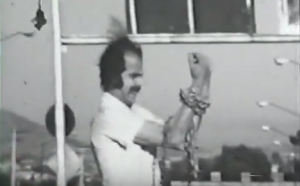
"A successful man living in a great metropolis is increasing awareness of the unjust social reality that lives in the absurdity. This immerses him in a uneasiness that sinks into alcoholism and depression. In his wandering through the streets viewer gets to be the unfortunate suicide of another victim of the meaninglessness of life, which will produce a series of dreamlike hallucinations bordering on the madness. In a stroke of consciousness of his misfortune, he does run aimlessly without course. Devastated, to the dawn, with the light of the dawn he sees to be reborn the hope personified in an innocent girl who stretches the hand donating bread" Internet Archive.
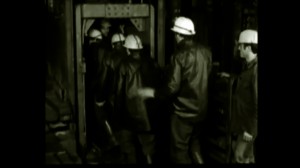
“Zonguldak Çatalağzı isimli kömür çıkarma kuyusunu 26 eylül 1969 yılında su basmış. Bu kuyu o dönem en fazla kömür üretimi gerçekleştirilen kuyu imiş. TKİ bir proje kapsamında suyu boşaltmış [...].” Sinematek.tv: http://sinematek.tv/catalagzi-kuyusu-1975/ (20 November 2019).
“The coal mine in Zonguldak, named Çatalağzı, was overflowed on September 26, 1969. The coal mine was the most productive one in the country at the time. Turkey's Directorate General of Coal Enterprises (the abbreviation “TKİ” stands for the Directorate) designed a project to put the water out [...].” Sinematek.tv: http://sinematek.tv/catalagzi-kuyusu-1975/ (20 November 2019).
"A record of local events in Burnley from 1932 through to 1950. Features a 1932 Hospital Carnival, a Burnley v Luton football match from 1935 and the last tram to run in the town on 7th May 1935. Wartime footage includes the activities of the Burnley Home Guard and a 'Wings for Victory' parade along Colne Road in 1943. King George VI visits Burnley on 8th March 1945 before newspaper headlines announce the end of the war and there are shots of street parties, dancing outside the Town Hall, fires being lit, a thanksgiving service at St Peters Church and an outdoor concert and ceremony at Towneley Park. The film ends with footage from the 1950 General Election at which local Labour MP Wilfrid Burke retains his seat." (NWFA Online Archive)
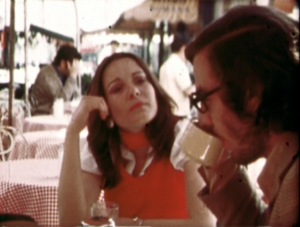
"Una cinta cargada de referencias a Jean-Luc Godard (Los Carabineros, 1963) pero sobre todo concentrada en la crítica mordaz al radicalismo de izquierda. Una vez más Marco Antonio Madrid hace el papel de protagonista, un joven de pelo largo, pantalón de mezclilla y saco, que se dedica a ligar en los cafés de la Zona Rosa adoctrinando a las mujeres. Lee a Marx después de hacer el amor, y se junta con sus amigos para brindar por "la muerte de la intelectualidad burguesa". Montero utiliza intertítulos como recurso irónico, una suerte de narrador externo que interpela la historia: "¿Qué es la intelectualidad burguesa?". La lucha revolucionaria del joven y sus amigos está teñida de sentido del humor. En una secuencia que recuerda mucho a Los Carabineros, suben al techo de una fábrica para iniciar la lucha armada (...) Por último un cartel proporciona una última burla: "Y si el sol es burgués detendremos al sol" " (Vázquez Mantecón, 2012).
"A film loaded with references to Jean-Luc Godard (The Carabineers, 1963), but above all focused on biting criticism to the radical left. Once again Marco Antonio Madrid plays the role of the lead character, a young man with long hair, jeans and coat, that dedicates his time to hook up in the coffee shops of the Zona Rosa indoctrinating women. He reads Marx after making love and he gets together with his friends to toast for the "death of the bourgeois intellectuality". Montero uses intertitles as a resource for irony, a sort of outside narrator that interpellates the story: "What is bourgeois intellectuality?". The revolutionary fight of the young man and his friends is filled with a sense of humor. In a sequence that reminds us of The Carabineers, they go to the rooftop of a factory to begin the armed fight. (...) Finally a sign shows one last derision "And if the sun is bourgeois, we will stop the sun" " (Vázquez Mantecón, 2012).
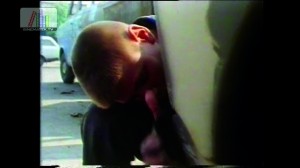
“O günlerde tam bir kültürel çöl olan İzmir’de sinema ile ilgili birşeyler yapabilmek (etkinlik, fim, yayın) çabası içindeyken, İstanbul öncesi kurucular arasında bulunduğum ve sinematek bölümünü yönettiğim İzmir Sinema ve Kültür Derneği’nin düzenlediği “Bağımsız Filmler’ temalı festivale filmleriyle davet ettiğim, tanıştığım Muammer Özer’le dostluğum ilerledi… Yıllar sonra İzmir’i ziyaret ettiği bir günde öğrencilerimden İbrahim Öğretmen ile (daha sonra Paris’e yerleşti, Gökşin Sipahioğlu ile uzun süre çalıştı) fotoğraf çalışmaları sırasında gözlediğim bir kenar semtteki artık camları değerlendiren işliklerden-işçilerden söz ettim. O günlerde Refik Durbaş’ın şiirinden, Livaneli’nin bir şarkısı da kulaklarımızdaydı.” Oğuz Makal, sinematek.tv: http://sinematek.tv/ciraklar-1980-2/ (9 November 2019).
“When I was trying to make something (a film, a publication, an event)—Izmir was like a ‘cultural desert,’ I started getting off with Muammer Özer whom I invited to the “Independent Film Festival” that İzmir Sinema ve Kültür Derneği [Izmir Cinema and Cultural Association which I established in Istanbul organized... After years, when one of my students—İbrahim Özen who moved to Paris and worked with Gökhan Sipahioğlu—came to Izmir, I talked to him about child workers trying to pick up waste glass in trash. During the course of these days, Refik Durbaş’s poem [Çırak Aranıyor/An Apprentice Wanted] and one song of Liveneli were ringing in our ears.” Oğuz Makal, sinematek.tv: http://sinematek.tv/ciraklar-1980-2/ (9 November 2019).
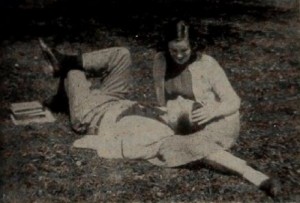
"Concerto, by Warren Doremus, is a sensitive and touching story of young love, following a couple from the joy of their graduation and marriage to the anguish and pain of the man's recall to war service in Korea. The telling of this simple tale has been done with such warmth that the observer cannot help being caught up in the current of emotions which fill the film. The performances of Sallie Dunn and George Harrison as the young couple convey the right mood for each scene with complete sincerity and heart, while Mr. Doremus's direction is forceful and yet restrained. Accompanied by and an interpretation of the Warsaw Concerto of Richard Addinsell, Concerto, the film, may truly be styled a cine tone poem." Movie Makers, Dec. 1953, 332.
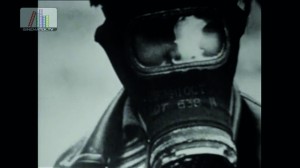
“1975 yılında yapılmıştır. İngiltere'nin İrlanda’daki sömürüsü, politik mahkumları, özgürlük mücadelesi hakkında 5 dakikalık bir filmdir. Dönemin görsel materyal azlığı koşullarında bol fotoğrafla ve az görüntülü bilgilendirme amaçlı bir filmdir.” Sinematek.tv: http://sinematek.tv/davut-ile-golyat/ (1 November 2019).
“It was made in 1975. This 5-minute-long film is about the British exploitation in Ireland, the political struggle [of the Irish people], and the fight for freedom. Because of the lack of visual material at the time of production, it purposefully benefits from the use of [the historical] photographs as counter-information.” Sinematek.tv: http://sinematek.tv/davut-ile-golyat/ (1 November 2019).
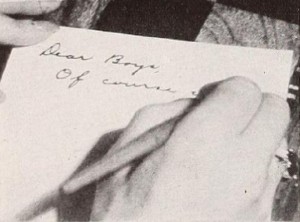
"Dear Boys is a personal motion picture which might have been made in many an American home this past year. Looking about him, C. Manley DeBevoise found his two sons in the Army and his once lovely flower garden changing into a Victory vegetable patch, well tended but mundane. It was from these materials, mixed with imagination and technical competence, that Mr. DeBevoise compiled his film. Mother is discovered (as the picture begins) writing the familiar greeting to her service sons. Her comments during the course of the letter provide the subtitles and the continuity for this attractive record of domestic doings, while Mr. DeBevoise's carefully sequenced scenes tell the story. Dear Boys is simple, sincere and a family film story which any movie maker would be proud to produce — and to own." Movie Makers, Dec. 1943, 477.
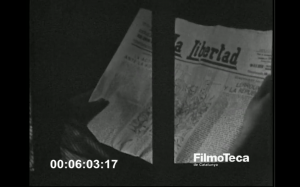
(Catalan): Film humorístic amateur, en el qual l'autor especula, irònicament, amb el significat literal dels diaris de l'època (1934), com per exemple, un presoner està llegint el diari LA LIBERTAD darrera de les reixes de la presó.
Film about the social impact of newspapers in the everyday life of the interwar period. It mixes fiction with documentary styles and warns against the political implication of mass media, especially in relation to their effect on workers, from a conservative perspective. [Description from the Filmoteca de Catalunya catalog]
Total Pages: 9